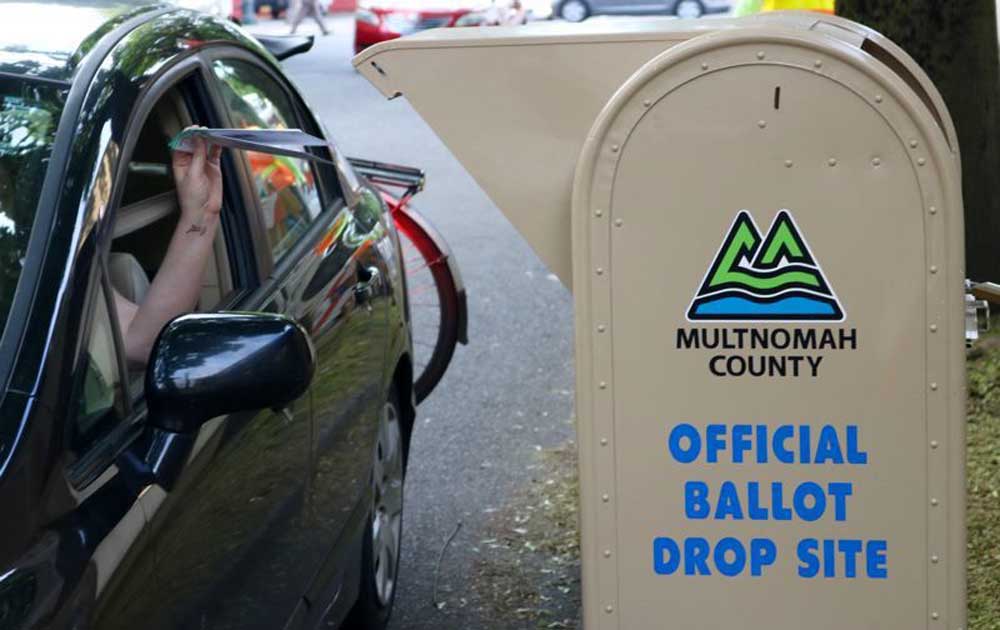Ballot bailout by minor parties likely helps Kotek in governor’s race
Published 12:51 pm Friday, September 9, 2022
SALEM — A minor-party candidate has dropped out of the race for governor in a move that will leave the November ballot with no candidates from parties to the left of Democrat Tina Kotek.
Nathalie Paravicini, who was cross-nominated for governor by the Progressive and Pacific Green parties, announced that she was ending her campaign and endorsing Kotek.
The move came as the Independent Party of Oregon effectively removed itself from any role in the 2022 governor’s after heated competition for a nod from the self-described “centrist” party ran off the rails in 2018.
The moves echo the 2018 campaign for governor, with important new wrinkles.
In 2018, Independent Party of Oregon nominee Patrick Starnes dropped out and endorsed Gov. Kate Brown, the incumbent Democrat.
Both Paravicini and Starnes gave the same reason — the Democrat promised to champion campaign finance reform if elected.
Oregon’s free-for-all campaign financing laws allow for unlimited contributions from any source.
Nike founder Phil Knight, the richest person in Oregon, has given $1.75 million to non-affiliated governor candidate Betsy Johnson so far in the 2022 race.
Knight gave over $2 million in 2018 directly to former Rep. Knute Buehler, R-Bend, the Republican candidate for governor. Starnes cited the contributions as a major reason he backed Brown.
But Starnes’ announcement came Oct. 30, with one week before the Nov. 6 election in 2018. Too late to have his name removed from the ballot.
Paravicini informed Secretary of State Shemia Fagan of her plan to withdraw last week.
“She will not appear on the ballot,” said Ben Morris, Fagan’s spokesperson.
Kotek faces two major challengers: Johnson and Republican Christine Drazan.
Two other minor party candidates will appear on the ballot: Libertarian R. Leon Noble of Newport, and Constitution Party nominee Donice Noelle Smith of Roseburg. Both are ideologically to the right of Kotek.
Johnson’s successful bid to get on the ballot via a petition drive means three major candidates vying for the state’s top job. Receiving as little as 40% of the general election vote could be enough to win the governor’s office. If the vote is close enough, 2 or 3 percent of the vote going to minor party candidates could swing the election.
In 2018, minor party nominations played a key, though turbulent role in the election for governor.
Political parties in Oregon can either nominate candidates of their own or “cross-nominate” another party’s candidate through a party caucus vote or by write-in votes in the primary.
The May 15, 2018 primary resulted in Brown easily winning the Democratic nomination for governor, while former Rep. Knute Buehler, R-Bend, won the GOP primary with 46% of the vote among 10 candidates.
Both Brown and Buehler mounted write-in campaigns to win the nomination of the Independent Party, the state’s self-described “centrist” party. A win would allow a candidate to include the party’s nomination alongside their main party designation on the general election ballot.
Write-in votes accounted for nearly 57% of the Independent Party primary vote, with Starnes, a home renovator and carpenter from Brownsville, running second with 25%.
The hand-count of write-in votes took until June 15. Starnes won with 6,030 votes. Buehler was second at 5,793 votes, with Brown third at 2,899 votes.
The liberal Working Families Party later cross-endorsed Brown.
Starnes’ decision just before the election to endorse Brown roiled the Independent Party. The party co-chair swiftly endorsed Buehler.
On Nov. 6, 2018, Brown won just 50.1% of the vote. But her victory margin looked larger since Buehler received just 43.7% of the vote.
Starnes’ received 53,392 votes, about 2.9% of the total. Combined with votes for Libertarian, Constitution, and Progressive candidates, a total of 117,511 votes went to candidates other than Brown and Buehler.
In 2022, the minor party votes percentages could swing an especially tight race.
The Working Families Party has endorsed Kotek.
The Independent Party is the largest of the minor parties in Oregon, witch has 137,790 registered members as of August, according to the Oregon Secretary of State.
Independent Party leaders announced last month that the party would not nominate a candidate or cross-nominate any of the current candidates on the ballot. Party leaders are free to endorse the candidate of their choice.




